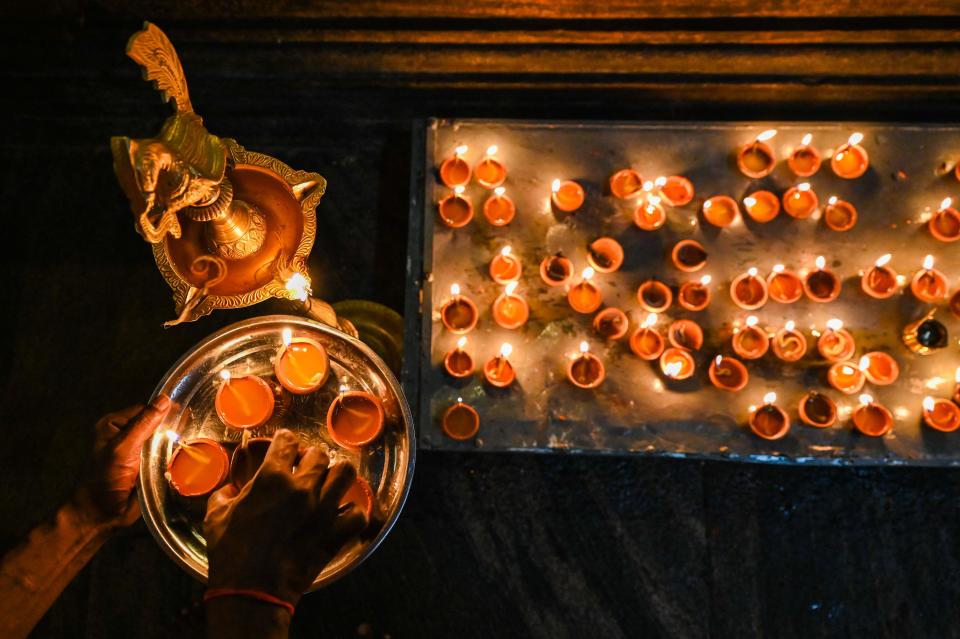Five things you should know about the festival of Diwali
Hindus, Sikhs, and Jains across the Indian subcontinent — and in Greater Columbus — are celebrating Diwali, the festival of lights, this week. The festival began on Saturday and lasts five days. The most important celebration, Laxmi Puja, occurs on Monday with the new moon.
Here are five things you should know about the holiday.
1. Diwali celebrates victory of good over evil
Diwali holds different meanings for different groups across South Asia, but a common theme is the victory of good over evil, light over darkness. This is symbolized by the millions of candles, lights and fireworks illuminating villages, towns and cities over the holiday.

In Hindi-speaking northern India, Diwali celebrates the victory of the god Rama over the demon-king Ravana, who had kidnapped his wife, Sita, and whisked her away to his island-kingdom of Lanka. The holiday is also a celebration of Laxmi, the goddess of wealth, and Ganesha, the remover of obstacles.
In southern India, Hindus celebrate the demon Narkasura being vanquished by Lord Krishna, an avatar of the god Vishnu. Bengali-speakers in eastern India also worship Kali, an all-powerful goddess, during Diwali.
2. Diwali is a multireligious festival
Besides Hindus, adherents of the Sikh and Jain faiths also celebrate Diwali.
For Jains, a minority concentrated in western India, the holiday marks the attainment of enlightenment by the spiritual teacher Mahavira, in 527 B.C.E.
Sikhs, another religious minority with a large diaspora in the U.S., commemorate the freeing of their spiritual leader Guru Hargobind by the Mughal Emperor Jahangir in the 17th century.

3. People celebrate withlights, fireworks, food and new clothes
Diwali is a time when people clean their homes and offices, buy new clothes and cook special foods.
During Laxmi Puja, the main night of Diwali, families decorate their homes with traditional butter lamps and rangoli, patterns made on the floor or tabletops using colorful powders.
Diwali:7 fun ways to celebrate Diwali with kids
Many people set off firecrackers and fireworks, although local governments in India have tried to ban the practice because of the pollution it creates. (This year, lighters of firecrackers in Delhi could face up to six months in jail.)
4. For Bhutanese Nepalis, Diwali is 'Tihar'
According to local nonprofit Bhutanese Community of Central Ohio, Greater Columbus is home to 30,000 Bhutanese Nepalis, many of whom celebrate Diwali, which they call “Tihar.”
On the first and second days of Tihar, the community worships crows and dogs, who are associated with Yamaraj, the god of death. Both crows and dogs are given special food, and dogs are garlanded with marigold flowers. On the third day, people place vermillion powder on the foreheads of cows.
“In Hinduism, we worship nature,” Shree Narayan Sandilya, the head priest of the Shree Laxmi Narayan Temple in Reynoldsburg, told The Dispatch. “We worship dogs because they protect us.”
The Nepali-speaking community also celebrates “bhai tika,” during which brothers seek blessings from their sisters, and sing “duesi bhailo” carols around their neighborhoods during Tihar.
5. Diwali celebrations around Greater Columbus
Several public events are being held to mark the holiday in Greater Columbus.
Worthington Park Library will hold a celebration for all ages from 6:30-7:30 p.m. on Wednesday.
For worshippers, BAPS Shree Swaminarayan Temple on Columbus’ East Side is holding a Chopda Pujan ceremony on Monday at 7 p.m. and an Annakut celebration on Wednesday.
On Saturday, the Bhutanese Nepali community celebrated Tihar at Civic Park in Reynoldsberg, and the Bengali-speaking community held a Kali Puja ceremony in Worthington.
Peter Gill covers immigration and new American communities for The Dispatch in partnership with Report for America. You can support work like his with a tax-deductible donation to Report for America here:bit.ly/3fNsGaZ.
pgill@dispatch.com
This article originally appeared on The Columbus Dispatch: Diwali: 5 things to know about festival of lights

